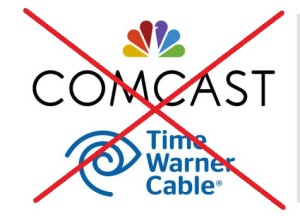The collapse last week of the proposed Comcast-Time Warner Cable merger shows what can be done when millions of consumers complain–formally, with regulators and lawmakers, or informally, by bitching to their neighbors, who it turns out have the same issues–about overpriced products accompanied by faulty service. Comcast needed approval for this combination from federal regulators, who indirectly are accountable to members of Congress. But what elected official would be willing to stand up and defend Comcast given this track record?
Since becoming New To Seattle, I have railed on in this space about Comcast, which is the dominant provider of Internet and cable TV service where I live.
One of my first posts way back in July 2011 was about how hard it was for Comcast to get things right, coming three times to my house after repeated calls by me accompanied by long hold times.
In every call, a cheery tape-recorded voice said, “We are currently experiencing a higher than normal call volume and longer than normal wait times.”
Now, you don’t have to be Isaac Newton to know that it’s mathematically impossible for every single instance to fall above the stated mean. This Comcast response–often the first impression it leaves with a new customer–is the real life equivalent of Lake Woebegon. That’s the fictional Minnesota town created by humorist Garrison Keillor where it is claimed with false pride that “all the children are above average.”
So the company clearly is fibbing a bit, insulting its customers but nowhere as funny as Keillor’s radio show, A Prairie Home Companion. I am speculating wildly here. But my assumption is that a very high-level decision was made against saying something with a little more candor, like, “You are being put on hold because we don’t spend enough on customer service so we can increase short-term profits for our shareholders and justify the total compensation of our CEO, Brian L. Roberts, who was paid $31 million in 2010.”
A 2013 post–entitled “Comcast remains closer to Lake Woebegone than Seattle“–highlighted fines assessed by the City of Seattle for service deficiencies and offered advice on how to negotiate lower Comcast fees, or at least reduce their increase.
Last year, I revisited Comcast twice. The first was “Seattle embraces high tech–except for the Internet.”
Four times in the past three weeks [the Internet] has gone out, for periods ranging from 30 minutes to four hours. Comcast outages usually aren’t that frequent, but they’re hardly uncommon, either. Since I also get my landline phone service from Comcast, and that blows when the Internet does, I have to call Comcast on my cellphone.
I don’t know whether to laugh like Jeff Bezos or cry like Bert Lahr’s Cowardly Lion in “The Wizard of Oz” when the tape tells me I quickly and easily can check on the status of the service problem (it’s never at my end) by going to a Comcast website. Remember, the reason I’m calling is that I can’t get quickly and easily to a Comcast website–or any other, either. (For some reason, the cable TV service I also get from Comcast rarely fails, meaning while I’m waiting I get to kill time by binge-watching something really stupid like “Keeping Up With the Kardashians.”)
A little more prescient was my post from last September, entitled, “In Seattle, Comcast track record hurts merger bid.”
I’m here to tell you the Comcast track record is slow, unreliable and overpriced.
In my Magnolia neighborhood, I have lost Internet and Internet-supplied phone service a half-dozen times or so in the past year, for periods ranging from a few minutes to hours. In other instances the speed has fallen way below what Comcast propaganda touted. Still, my monthly Comcast bill just went up 13%.
I don’t think it’s just me. Comcast’s operational snafus in Seattle are so persistent that complaining customers are told they can use their cell phones to check on problems. This is amazing considering that Comcast, a phone service provider, doesn’t offer cells. When was the last time you repeatedly heard any company routinely refer complaining customers to direct competitors? …
Unless they start regulating a hell of a lot better, regulators ought to block the Comcast-TWC merger. Period.
My little voice undoubtedly was not heard. But it joined a large chorus that was. Especially in Seattle, the contrast couldn’t be sharper between damn-the-customer Comcast and delight-the-customer Amazon.com. I have no doubt that both companies hanker to have monopolies; I’ve never encountered a business boss who didn’t. But, as Comcast now has proven, you don’t get there by acting like a monopolist before the fact.
Gee, I’m almost out of breath.

